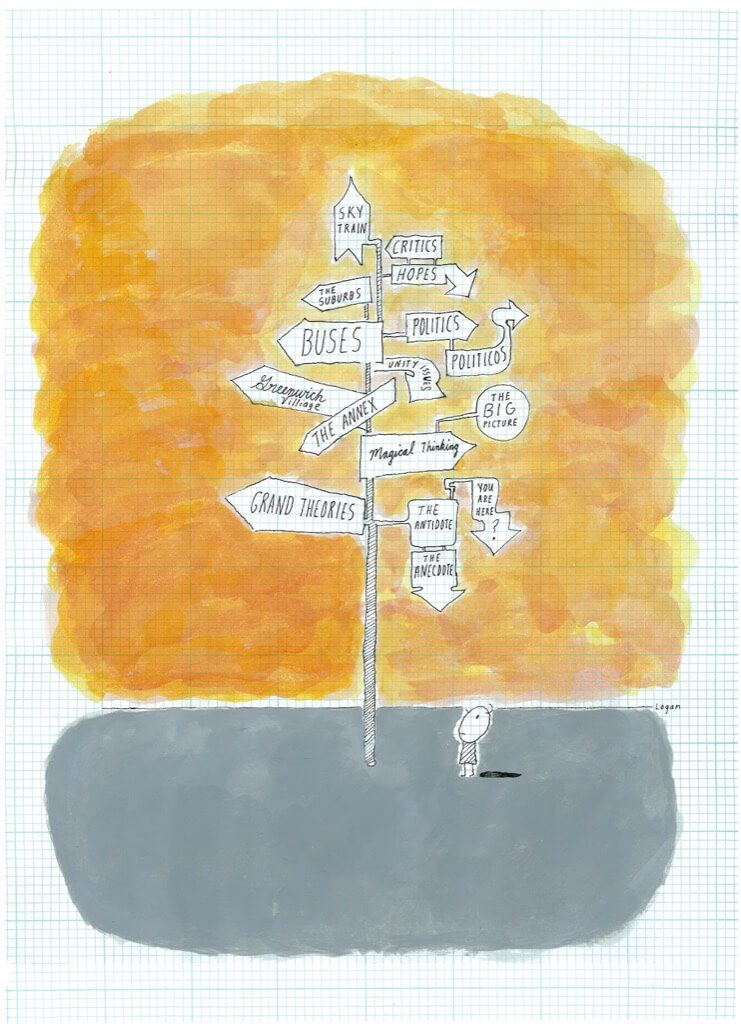
Most remember Jane Jacobs, who died one year ago, as a visionary. Her 1961 book The Death and Life of Great American Cities, a jeremiad against grand urban schemes, has been called the most important book about cities of the twentieth century. Although Jacobs initially faced her share of criticism—urban historian and critic Lewis Mumford wrote a snide article on Death and Life titled “Mother Jacobs’ Home Remedies for Urban Cancer”—by the time she died her ideas had received wide embrace. Her writings on cities are gospel to the many who share her view that neighbourhoods should be dense and mixed use, that planning should prioritize people over cars, and that the chaos of urban life should be celebrated, not suppressed.
Jacobs’s most famous writings are about cities, but there is a sense in which she was hailed not only as an urban guru but more broadly as a fount of useful, grounded thinking in an alienating age of globalization and expertise. The City of Toronto once held a conference called Jane Jacobs: Ideas That Matter, from which an annual prize and a quarterly newsletter followed. Canadians especially celebrate Jacobs’s humble methodology of stepping down from analytical models and high theories to observe facts on the ground. This is a style Jacobs began in Death and Life, in which she analyzes cities not as top-down blueprints but as webs of human-scale components such as streets, parks, blocks, and sidewalks. The Jane Jacobs we have come to adore is not only a champion of cities, but also an oracle who reminds us of crucial truths that have escaped our collective memory and gently guides us back from the brink.
Jacobs’s body of work—she wrote seven books in all—displays a widening intellectual ambition. Tracing a path from architecture critic to urban prophet to all-purpose philosopher, Jacobs began by writing about sidewalks and finished with an account of Western civilization itself. In The Question of Separatism, she argues that the benefits of Quebec sovereignty outweighs the costs. In Systems of Survival, she examines the ethos underlying commercial and political life. In The Nature of Economies, she explores the linkages between economics and ecology. And in Dark Age Ahead, she warns of a collapse of the institutions that keep our civilization afloat. Should we remember Jacobs only for her views on cities or for the broader range of topics she took on later in life? More fundamentally, if indeed Jacobs was a visionary, does her vision still hold true for the world today, or is her work the remnant of the politics of an era—the 1960s and 1970s—whose relevance has passed?
Jacobs wasn’t a separatist. But for a transplanted American living in Ontario, she was pretty close. Here’s what she says at the outset of The Question of Separatism, based on her 1979 Massey Lectures:
Canadians who are indifferent to the question of Quebec separatism are likely either to identify primarily with their own province . . . or else to identify with a Canada which—for all they care emotionally—may or may not include Quebec. That is how I feel about the question . . . . Quebec seems to me to be already separate and different from what I understand as my own national community.
Jacobs proceeds to attack some common pro-unity arguments. Do breakups of polities inevitably entail disintegration and decline? No, says Jacobs, pointing to the 1905 secession of Norway from Sweden, a peaceful divorce that she argues ultimately benefited both countries. If Quebec separates, won’t both Quebec and Canada be even harder pressed to support world-class businesses, universities, and cultural institutions? No. Small economies can be just as innovative as large ones, sometimes more so. Quebec separatism could have the further benefit of unshackling Quebec from the centralizing strictures of the federal bureaucracy—including its “arbitrary and silly” bilingualism policy—leaving Quebecers free to undertake new policy and business experiments on their own.
Jacobs’s argument is selective. She does not deal with many of the best arguments against separatism: that many Quebecers want to remain in Canada; that Quebec’s language and culture have flourished while remaining within Confederation; that if Canada is divisible, perhaps so is Quebec. The result is a rather unusual product: a refutation of some of the weaker arguments against secession.
Perhaps The Question of Separatism should be read as an attempt to depoliticize statehood and nationality—to encourage a transfer of the energy citizens devote to their nation to the more intimate level of local communities, which Jacobs regarded as the true guarantors of human well-being. This desire to shift political energy downward, expressed in the midst of the Cold War, must have looked prescient in the years that followed the fall of the Berlin Wall and the collapse of the Soviet Union, when world politics was said to have entered a post-nationalist, post-ideological age in which states mattered less and “global cities” more. Post 9/11, however, Jacobs’s desire appears naive and even irresponsible.
Two of Jacobs’s subsequent books, Systems of Survival and The Nature of Economies, take the form of dialogues among a set of fictional intellectuals. Both tackle huge subjects, but Systems of Survival is more rewarding. It deals with the “moral foundations of commerce and politics,” attempting to systematize the values that underlie all kinds of work. These values, says Jacobs, are an essential part of a healthy society. Combining observations from a wide range of disciplines, she divides these values into two “moral syndromes,” the commercial and the guardian.
The commercial syndrome applies to businesspeople, traders, and scientists, and includes several edicts that one might assume such groups would embrace: “compete,” “use initiative and enterprise,” “be efficient,” “invest for productive purposes,” “be industrious,” and “be thrifty.” However, it also includes values not traditionally associated with the private sector. For instance, “collaborate easily with strangers and aliens” emphasizes the trust, tolerance, and cosmopolitanism necessary to encourage business transactions in a complex economy. And “dissent for the sake of the task” extends the political notion of dissent to the realm of business, emphasizing that commercial innovations face opposition and ridicule the same way that new political ideas often do.
The guardian syndrome, on the other hand, applies to politicians, soldiers, civil servants, police, and religious officials, among others. It encompasses a very different set of principles, including “shun trading,” “respect hierarchy,” “take vengeance,” “dispense largesse,” “exert prowess,” and “deceive for the sake of the task.” Some of these “virtues,” such as vengefulness and deception, originated on ancient battlefields and are endorsed less today. Nevertheless, they remain a part of the guardian mentality, as in the idea that it’s acceptable for a police officer to deceive a suspect in order to catch her. As with the commercial syndrome, the guardian syndrome is not Jacobs’s own ethical prescription for political life, but rather her synthesis of what others have recommended throughout history and across professional cultures.
The values within each syndrome operate symbiotically, such that if one virtue collapses, the entire system becomes corrupted. And when the two moral syndromes mix, they create what Jacobs calls “monstrous hybrids,” examples of which include the Mafia, the Soviet Union, and Nazi medical researchers. Jacobs’s ad-monition against mixing is particularly relevant at a time when policy-makers talk of public-private partnerships, stakeholders, and market-oriented regulation. Most opponents of public-private combinations fear the private side, worrying that the cost-cutting and profit-maximizing impulses of the business ethos will hurt the public sector’s ability to serve the greater good. Jacobs’s warning is different. It holds that commerce ought to avoid guardian values as much as guardians ought to avoid commercial values. If anything, Jacobs’s scheme suggests that commercial actors should be more worried about adopting guardian values, such as centralization, tradition, and hierarchy, than guardians should fear commercial values.
Jacobs’s pro-business, anti-government leanings in Systems of Survival are by no means exceptions. Her protagonists are almost always plucky entrepreneurs—usually small, locally oriented, and socially conscious, but always for profit. Where public actors appear, they are usually the villains, centralizing power, decking the halls with red tape, and investing in useless boondoggles. Unlike the entrepreneurs, who are often identified in endnotes as Jacobs’s friends or friends of friends, the public officials are nameless bureaucrats, who are at best misguided people with good intentions, at worst imperious megalomaniacs who undermine freedom, thwart innovation, and muffle diversity.
The Nature of Economies, a slim book featuring most of the same themes as Systems of Survival, is not what one might expect from a title that suggests both the environment and economics. It is neither a small-is-beautiful-style denunciation of growth nor an economic analysis of environmental problems. Instead, it is a broad-strokes, surprisingly cheery discussion of how ecological principles can help improve economies. The Nature of Economies does not promote a specific form of “green economics,” but is rather a description of ecologically dictated realities that economists would do well to acknowledge.
Ecology leads Jacobs to redefine economic development not as quantitative growth, but as qualitative change. Economies develop by becoming more complex and diversified. This insight cuts against what Jacobs sees as the orthodox economist’s view: that economies should specialize in what they do best. Jacobs’s economic development strategy is not really a strategy at all, but rather a way of hedging bets. Because diversification is good, because the future of complex systems like economies and ecosystems is nearly impossible to predict, governments and businesses should avoid putting all their development eggs in one basket. Economic futures should be shaped not by centralized policy-making but by scores of innovating private enterprises. Jacobs’s picture of the economy is akin to the best mixed-use neighbourhoods: manageable, human scale, replete with variety, and run by people you know and trust. The book, published in 2000, does not address outsourcing, and for all its dutiful emphasis on interdependence and interconnectedness, The Nature of Economies proceeds almost as if economies existed in isolation from global competition and the extraordinary wealth inequality that shapes economic patterns everywhere.
The optimism driving The Nature of Economies appears to screech to a halt with Jacobs’s final book, published four years later. Dark Age Ahead is a warning of North America’s cultural decline. Jacobs sees the harbingers of a dark age in the decay of five crucial institutions. Family and community are being destroyed by unaffordable housing, suburbanization, and car culture. Higher learning is being replaced by “credentialing,” driven by what Jacobs sees as our culture’s unhealthy obsession with jobs. Science is being abandoned for pseudo-science. Taxation is being “dumbed down,” with the governments collecting taxes being too far removed from the people they serve. Professional self-policing seems increasingly incapable of catching corrupt behaviour, as evidenced by the corporate scandals of Enron and Arthur Andersen.
Unfortunately, Dark Age Ahead is long on assertions and short on reasoning. One of the joys of Jacobs’s earlier works is the way she supports her arguments with fresh and variegated examples. In Dark Age Ahead, her evidence is scant and consists largely of hobby horses: centralization, sprawl, the planning failures of traffic engineers, economists’ fixation on exports, the New York City expressway schemes of infamous planner Robert Moses. All this suggests a troubling trend in Jacobs’s writings: the more ambitious her subject, the less thoroughly she seems to support her arguments.
Despite these shortcomings, Dark Age Ahead received surprisingly few negative reviews. And this lack of critical response to Jacobs’s writing was not atypical. “Among Canadians who know her work,” writes Alice Sparberg Alexiou in a recent biography, “Jane Jacobs is immune to criticism.” What has kept the critics quiet? Some of it may be good old Canadian deference—respect for one’s elders, especially if they are our own. Some of it may be part of a tradition of criticizing gingerly within Canada’s literary and intellectual class. But at least as much of Jacobs’s success at evading criticism must be attributed to the woman herself and to the public persona she cultivated since arriving in Canada in 1968.
Backed by her own lack of formal training (she left Columbia University after two years of undergraduate study) and her grandmotherly demeanour, she cast herself as an underdog in a world of credentialed experts—be they economists, traffic engineers, civil servants, or professors—and her attacks on them could be unrelenting. Like a populist politician, she cast her opponents as out of touch with reality, ignorant of plain facts, and dismissive of regular folks. She evoked a pleasant nostalgia, both through her words, which were more about restoration than revolution, and through what she as a public figure represented: the possibility that an untrained polymath whose laboratory is the world around her and whose tools are her eyes, ears, and com-mon sense can still, in this specialized age, advance ideas that will change the world.
Through these traits, Jacobs cultivated a large and intensely loyal following, including politicians of every stripe (Prime Minster Harper recently said he has been inspired by her environmental ideas). To criticize Jacobs, then, is on some level to incur that following’s wrath. Because of who Jacobs was, criticism also opens one up to charges of snobbery, of bullying, and of orthodoxy. Easier, perhaps, just to say nothing.
The popularity of Jacobs’s ideas also helped her score major political victories in Canada—triumphs of far greater scope than the expressway stop-pages she helped secure in Greenwich Village and Toronto’s Annex neighbourhood in the 1960s and 1970s. The Toronto mayoral candidate she backed in 2003, David Miller, was recently rewarded with a second term. The “cities agenda” of granting more resources to municipalities, which Jacobs vigorously advocated, has become a head-line issue over the past half-decade and is a concrete realization of Jacobs’s lifelong effort to push political effort toward the local level. And anyone writing on urban affairs in this country, whether policy-maker, journalist, or academic, would be hard-pressed not to cite Jacobs’s ideas.
Considering these victories, it may be worth remembering Jane Jacobs in a different light. Jacobs was the author of one great book and several other books that, despite tackling increasingly ambitious topics, are unlikely to have any lasting impact. While it may have been right to follow Jacobs’s ideas in designing city blocks, it would be unwise to take her advice on separatism, economics, ethics, and the decline of civilization. But to judge Jacobs’s impact based on ideas alone would overlook her considerable political acumen—the subtle collection of skills, including the ability to convey political naïveté, that helped win her influence and adoration. In the end, perhaps we should commemorate Jacobs less as a visionary and more as a citizen—a word that, after all, means not only member of a state, but also city dweller.






